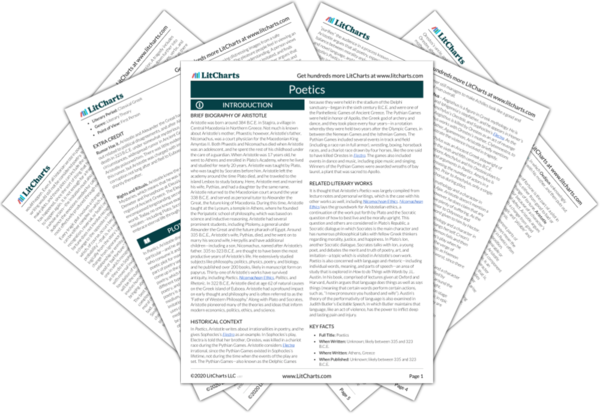Summary
Analysis
4.1 Definition. According to Aristotle, tragedy “is an imitation of an action that is admirable, complete and possesses magnitude.” Tragedy is written in “language made pleasurable” (meaning language that has rhythm and melody), and it can be separated into parts of verse or song. Tragedy is performed by actors, not by narration, and tragedy purifies the audience by eliciting in them the emotions of fear and pity in a process known as catharsis.
4.2 Component Parts. Since imitation is performed by actors in a tragedy, spectacle is a component part of tragedy. Additional components are lyric poetry (song) and diction (the composition of the verse), which are the media through which the imitation is performed. A tragedy imitates an action (the plot) that is performed by actors, and these actors have a certain kind of character (they are either admirable or inferior). The actors express themselves through reasoning, which they use to argue a point or state an opinion. To recap, a tragedy has six components—plot, character, diction, reasoning, spectacle, and lyric poetry—and these components determine a tragedy’s quality.
Spectacle encompasses the special effects of tragedy that are not related to language. Spectacle can include sights or sounds, and it is not present in epic poetry. Much like Aristotle gave a comprehensive definition of tragedy, he likewise gives detailed definitions of each of the component parts of a tragedy. Just as in Aristotle’s definition of tragedy, a tragedy must include all the component parts—otherwise, it isn’t a tragedy at all.
Themes
4.3 The Primacy of Plot. Every tragedy, Aristotle repeats, has spectacle, character, plot, diction, lyric poetry, and reasoning; however, plot is the most important component part. Tragedy is not an imitation of people, Aristotle says, “but of actions and of life.” People are either admirable or inferior, but their fortune and whether it is good or bad is based on “how they fare.” The events of life—the plot—is what a tragedy aims to imitate, and this makes plot the most important component part of tragedy. Furthermore, the most effective way in which a tragedy produces catharsis is through reversal and recognition, both of which are part of the plot.
Aristotle claims that events and people are either good or bad, but their fortune (i.e., how they end up at the end of the play) has nothing to do with morality. A character’s fortune is based on how they “fare” or manage good or bad events. Thus, it is possible in a tragedy for good characters to end up with bad fortune and for bad characters to end with good fortune. Catharsis through reversal and recognition is a primary part of Aristotle’s argument, and he returns to it later in the text.
Themes
4.4 The Ranking Completed. Plot is the most important component part of tragedy, Aristotle repeats, and character is second in importance. Reasoning is third: it allows for characters to say what is appropriate and important, which, written in prose, serves the purpose of rhetoric. Contemporary poets make their characters speak rhetorically, and reasoning is the way in which they argue a point or express ideas. Fourth important is diction, or the “verbal expressions” used in tragedy, which does the same thing in verse and in prose.
Aristotle repeatedly says that plot is the most important part of tragedy, which reflects plot’s significance within his broader argument of the superiority of tragedy. Aristotle only briefly touches on reasoning and rhetoric in Poetics. A more comprehensive interrogation of the elements can be found in Aristotle’s Rhetoric.
Themes
Get the entire Poetics LitChart as a printable PDF.

Lyric poetry, or song, is the most important of the “sources of pleasure” within a tragedy. Spectacle (the visual effects of a tragedy) “is attractive,” but it is not artistic and is least relevant to poetry. Spectacle has more to do with “the art of the property-manager,” Aristotle says, than with the art of the poet.
Lyric poetry is a “source of pleasure” because it relies on rhythm and melody, which Aristotle has already identified as a natural source of pleasure for humans. Spectacle, something that by definition is visually appealing and “attractive,” does not rely on language at all, but on stage production from the “property-manager.” Thus, spectacle is least relevant component of poetry.
Themes












